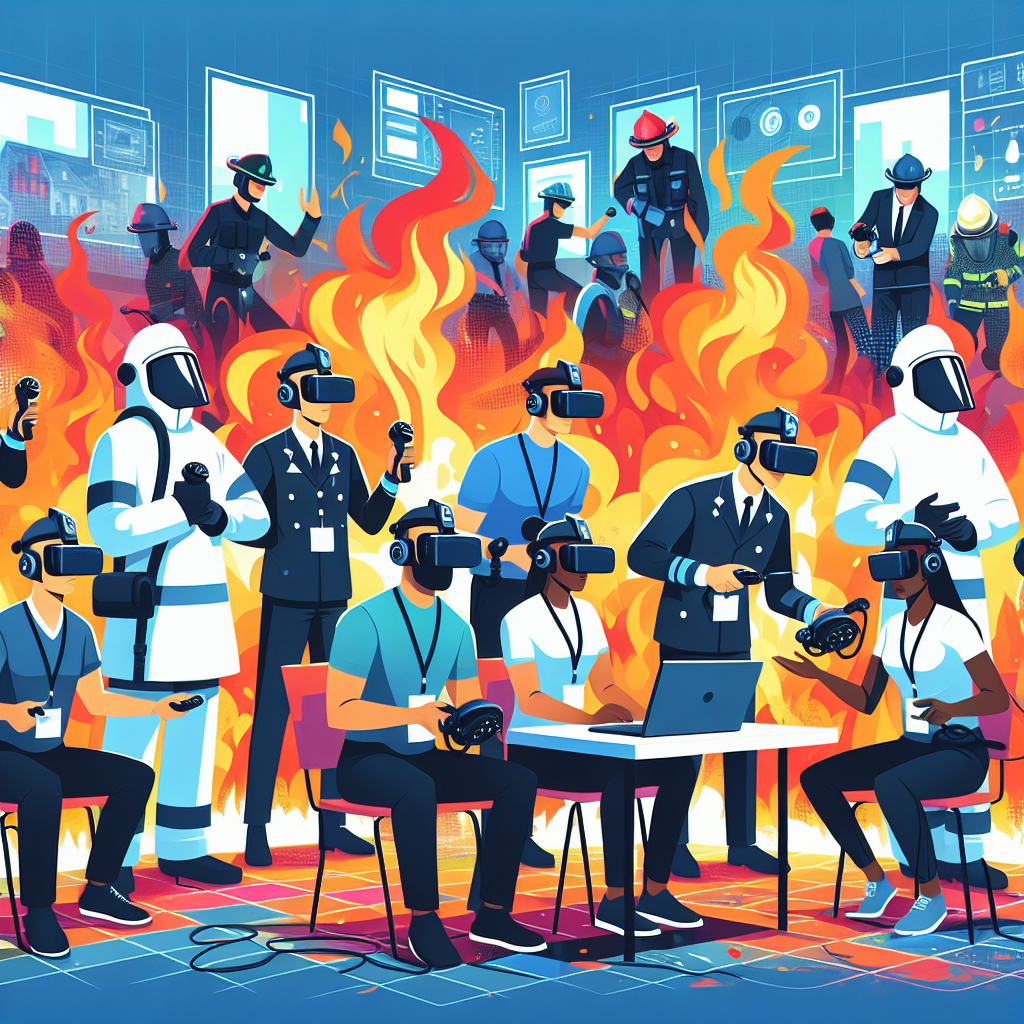Virtual reality (VR) technology is emerging as a promising tool for training fire investigators. Researchers at the University of Dundee, in collaboration with emergency services, have developed a method to create mock crime scenes that simulate real-life fire scenarios. By conducting controlled burns and meticulously measuring the outcomes, they can gather valuable data that informs the investigation process. This innovative approach allows for the reconstruction of fire scenes in a virtual environment, providing a unique opportunity for training and analysis.
The use of VR in fire investigation training has shown significant potential. Studies indicate that investigators who utilize this technology are more successful in determining the origin and progression of fires. The immersive nature of virtual reality enables trainees to engage with the scene in a way that traditional training methods cannot replicate. By experiencing the dynamics of a fire in a controlled virtual setting, investigators can enhance their skills and improve their understanding of fire behavior.
The team at the University of Dundee envisions a future where virtual reality becomes a standard component of training for new fire investigators. This technology not only facilitates hands-on learning but also promotes collaboration among various emergency services. By sharing data and experiences in a virtual format, investigators can learn from one another and develop a more comprehensive understanding of fire investigation techniques.
Moreover, the application of VR extends beyond training; it can also serve as a valuable tool for data sharing. Investigators can present their findings in a virtual environment, allowing for easier communication and collaboration with colleagues and other stakeholders. This capability could lead to more efficient investigations and improved outcomes in fire-related incidents.
In conclusion, the integration of virtual reality into fire investigation training represents a significant advancement in the field. As researchers continue to explore its potential, the hope is that VR will not only enhance the skills of new investigators but also foster a culture of collaboration and knowledge sharing among emergency services. This innovative approach may ultimately lead to more effective fire investigations and improved public safety.
Original news source: Investigating crime scenes in virtual reality (BBC)
🎧 Listen:
Slow
Normal
Fast
📖 Vocabulary:
| 1 | emerging | Coming into view or becoming apparent |
| 2 | promising | Showing signs of future success or potential |
| 3 | simulate | To imitate or replicate the appearance or characteristics of something |
| 4 | meticulously | In a way that shows great attention to detail |
| 5 | reconstruction | The process of building or forming something again |
| 6 | immersive | Deeply engaging or absorbing, often creating a sense of being surrounded |
| 7 | dynamics | The forces or properties that stimulate growth, development, or change |
| 8 | envisions | Imagines or foresees a future possibility |
| 9 | facilitates | Makes an action or process easier |
| 10 | collaboration | Working together with others to achieve a common goal |
| 11 | stakeholders | Individuals or groups with an interest or concern in something |
| 12 | integration | The act of combining or incorporating different elements |
| 13 | advancement | Progress or development in a particular area |
| 14 | foster | To encourage or promote the development of something |
| 15 | comprehensive | Thorough and complete, covering all or nearly all elements or aspects |
Group or Classroom Activities
Warm-up Activities:
– CHARADES
Instructions: Students will act out different terms related to virtual reality and fire investigation without speaking. Classmates will guess the word or phrase based on the actions. Terms can include “virtual reality,” “fire investigation,” “controlled burn,” and “emergency services.”
– OPINION POLL
Instructions: Students will discuss their opinions on the effectiveness of virtual reality in training for various professions, including fire investigation. They will then conduct a quick poll within the class, asking each other to express their views and tallying the results on the board.
– MIND MAP
Instructions: In small groups, students will create a mind map based on the article. They will identify key concepts like “VR technology,” “fire training,” “collaboration,” and “data sharing,” connecting related ideas and discussing their significance in the context of fire investigations.
– HEADLINE CREATION
Instructions: Students will be tasked with creating catchy headlines for the article. They should aim to summarize the main points in an engaging way, focusing on the innovative use of virtual reality in fire investigation training.
– TWO TRUTHS AND A LIE
Instructions: Students will individually come up with three statements about the article—two true statements and one false one. They will share their statements with a partner, who will then guess which one is the lie, fostering discussion and comprehension of the article’s content.
🤔 Comprehension Questions:
1. What method did researchers at the University of Dundee develop for training fire investigators?
2. How does virtual reality (VR) technology enhance the training experience for fire investigators compared to traditional methods?
3. What are the benefits of conducting controlled burns in the research process for fire investigation?
4. In what ways does VR facilitate collaboration among different emergency services during training?
5. What potential future role do researchers envision for virtual reality in the training of new fire investigators?
6. How might the use of VR in fire investigations improve communication among investigators and stakeholders?
7. What outcomes do researchers hope to achieve by integrating virtual reality into fire investigation training?
8. How does the immersive nature of VR contribute to the understanding of fire behavior for trainees?
Go to answers ⇩
🎧✍️ Listen and Fill in the Gaps:
Virtual reality (VR) technology is emerging as a promising tool for training fire investigators. Researchers at the (1)______ of (2)______, in collaboration with emergency (3)______, have developed a method to create mock crime scenes that simulate real-life fire scenarios. By conducting controlled (4)______ and meticulously measuring the outcomes, they can gather valuable data that informs the investigation process. This innovative approach allows for the reconstruction of fire scenes in a virtual environment, providing a unique opportunity for training and analysis.
The use of VR in fire investigation training has shown significant potential. Studies indicate that investigators who (5)______ this technology are more successful in determining the origin and progression of fires. The immersive nature of virtual reality enables trainees to engage with the scene in a way that traditional training (6)______ cannot replicate. By (7)______ the dynamics of a fire in a (8)______ virtual setting, investigators can enhance their skills and improve their understanding of fire behavior.
The team at the University of Dundee envisions a future where virtual reality becomes a standard component of training for new fire investigators. This technology not only facilitates hands-on (9)______ing but also promotes collaboration among various emergency services. By sharing data and experiences in a virtual format, investigators can learn from one another and develop a more comprehensive understanding of fire investigation techniques.
Moreover, the application of VR (10)______ beyond training; it can also serve as a valuable tool for data sharing. Investigators can (11)______ their (12)______ in a virtual environment, allowing for easier communication and collaboration with colleagues and other stakeholders. This capability could lead to more efficient investigations and improved outcomes in fire-related incidents.
In conclusion, the (13)______ of virtual reality into fire investigation training represents a significant advancement in the (14)______. As researchers continue to explore its potential, the hope is that VR will not only (15)______ the skills of new investigators but also foster a culture of collaboration and knowledge sharing among emergency services. This innovative approach may ultimately lead to more effective fire investigations and improved public (16)______.
Go to answers ⇩
💬 Discussion Questions:
Students can ask a partner these questions, or discuss them as a group.
1. What is your opinion on the use of virtual reality technology in training for emergency services?
2. How would you feel if you had the opportunity to train using virtual reality for a job you are interested in?
3. Do you think traditional training methods are sufficient for preparing fire investigators? Why or why not?
4. What is a significant advantage of using virtual reality in training compared to hands-on experience?
5. How do you think the use of VR could change the way we approach training in other fields, such as medicine or aviation?
6. Do you like the idea of experiencing dangerous situations in a virtual environment instead of in real life? Why?
7. How would you feel if virtual reality became the standard training tool for all emergency responders?
8. Do you think that collaboration through virtual platforms can improve teamwork among emergency services? Why or why not?
9. What is a potential drawback of relying heavily on virtual reality for training purposes?
10. How do you think the integration of VR in training could impact public safety in the long run?
11. Do you believe that hands-on experience is more valuable than virtual training? Why or why not?
12. How would you react if you were required to use virtual reality as part of your training for a job?
13. What is a way that virtual reality could be misused in a training context?
14. Do you think that the use of VR in training could help reduce the number of accidents during real-life emergency situations? Why?
15. How do you envision the future of training for emergency services evolving with the advancement of technology like VR?
Individual Activities
📖💭 Vocabulary Meanings:
Match each word to its meaning.
Words:
1. emerging
2. promising
3. simulate
4. meticulously
5. reconstruction
6. immersive
7. dynamics
8. envisions
9. facilitates
10. collaboration
11. stakeholders
12. integration
13. advancement
14. foster
15. comprehensive
Meanings:
(A) Deeply engaging or absorbing, often creating a sense of being surrounded
(B) Makes an action or process easier
(C) The act of combining or incorporating different elements
(D) To imitate or replicate the appearance or characteristics of something
(E) The process of building or forming something again
(F) In a way that shows great attention to detail
(G) The forces or properties that stimulate growth, development, or change
(H) Coming into view or becoming apparent
(I) Individuals or groups with an interest or concern in something
(J) Progress or development in a particular area
(K) To encourage or promote the development of something
(L) Showing signs of future success or potential
(M) Working together with others to achieve a common goal
(N) Thorough and complete, covering all or nearly all elements or aspects
(O) Imagines or foresees a future possibility
Go to answers ⇩
🔡 Multiple Choice Questions:
1. What technology is being developed for training fire investigators?
(a) Augmented reality (AR)
(b) Artificial intelligence (AI)
(c) Robotics
(d) Virtual reality (VR)
2. Which university is collaborating with emergency services to develop VR training methods?
(a) University of Edinburgh
(b) University of Glasgow
(c) University of Dundee
(d) University of Aberdeen
3. What is one benefit of using VR in fire investigation training?
(a) Reduced training costs
(b) Enhanced understanding of fire behavior
(c) Increased paperwork
(d) Limited interaction with real scenarios
4. How does VR training differ from traditional training methods?
(a) It provides an immersive experience
(b) It requires less time to complete
(c) It is less expensive
(d) It eliminates the need for instructors
5. What future vision does the team at the University of Dundee have for VR technology?
(a) To replace all traditional training methods
(b) To make it a standard component of training
(c) To limit its use to experienced investigators
(d) To focus solely on data analysis
6. In addition to training, how else can VR be utilized in fire investigations?
(a) For public relations campaigns
(b) For equipment testing
(c) For data sharing and collaboration
(d) For legal proceedings
7. What outcome is hoped for as VR technology is integrated into fire investigation training?
(a) More effective fire investigations
(b) Decreased funding for fire services
(c) Longer training periods
(d) Fewer fire incidents
8. What aspect of VR training promotes collaboration among emergency services?
(a) Competing against one another in simulations
(b) Limiting access to training resources
(c) Focusing only on individual performance
(d) Sharing data and experiences in a virtual format
Go to answers ⇩
🕵️ True or False Questions:
1. The integration of virtual reality into fire investigation training is not considered a significant advancement that may lead to improved public safety.
2. The VR training method does not involve conducting controlled burns and measuring outcomes to gather data for fire investigations.
3. The immersive nature of virtual reality restricts trainees from fully engaging with fire scenes in a way that traditional training cannot replicate.
4. The University of Dundee team envisions virtual reality becoming a standard part of training for new fire investigators in the future.
5. Studies show that fire investigators who use virtual reality technology are more successful in determining the origin and progression of fires.
6. Researchers at the University of Dundee have developed a method to create mock crime scenes for fire investigation training using virtual reality technology.
7. VR technology hinders collaboration among various emergency services by allowing investigators to share data and experiences in a virtual format.
8. Virtual reality can also be used as a tool for data sharing, facilitating communication and collaboration among investigators and stakeholders.
Go to answers ⇩
📝 Write a Summary:
Write a summary of this news article in two sentences.
Check your writing now with the best free AI for English writing!
Writing Questions:
Answer the following questions. Write as much as you can for each answer.
Check your answers with our free English writing assistant!
1. How has virtual reality technology changed the training process for fire investigators at the University of Dundee?
2. What benefits do studies suggest VR provides to fire investigators in determining the origin and progression of fires?
3. In what ways does the use of VR promote collaboration among different emergency services during fire investigations?
4. How might the ability to present findings in a virtual environment improve communication among investigators and stakeholders?
5. What future developments do researchers at the University of Dundee hope to see regarding the integration of VR in fire investigation training?
✅ Answers
🤔✅ Comprehension Question Answers:
1. What method did researchers at the University of Dundee develop for training fire investigators?
Researchers at the University of Dundee developed a method to create mock crime scenes that simulate real-life fire scenarios using virtual reality technology.
2. How does virtual reality (VR) technology enhance the training experience for fire investigators compared to traditional methods?
VR technology enhances the training experience by providing an immersive environment that allows trainees to engage with fire scenes in a way that traditional methods cannot replicate, improving their understanding of fire behavior.
3. What are the benefits of conducting controlled burns in the research process for fire investigation?
Conducting controlled burns allows researchers to gather valuable data on the outcomes of fire scenarios, which informs the investigation process and aids in the reconstruction of fire scenes in a virtual environment.
4. In what ways does VR facilitate collaboration among different emergency services during training?
VR facilitates collaboration by allowing investigators to share data and experiences in a virtual format, enabling them to learn from one another and develop a more comprehensive understanding of fire investigation techniques.
5. What potential future role do researchers envision for virtual reality in the training of new fire investigators?
Researchers envision that virtual reality will become a standard component of training for new fire investigators, promoting hands-on learning and collaboration among emergency services.
6. How might the use of VR in fire investigations improve communication among investigators and stakeholders?
The use of VR allows investigators to present their findings in a virtual environment, making it easier to communicate and collaborate with colleagues and other stakeholders, potentially leading to more efficient investigations.
7. What outcomes do researchers hope to achieve by integrating virtual reality into fire investigation training?
Researchers hope to enhance the skills of new investigators, foster a culture of collaboration and knowledge sharing among emergency services, and ultimately lead to more effective fire investigations and improved public safety.
8. How does the immersive nature of VR contribute to the understanding of fire behavior for trainees?
The immersive nature of VR allows trainees to experience the dynamics of a fire in a controlled virtual setting, which helps them enhance their skills and improve their understanding of fire behavior.
Go back to questions ⇧
🎧✍️✅ Listen and Fill in the Gaps Answers:
(1) University
(2) Dundee
(3) services
(4) burns
(5) utilize
(6) methods
(7) experiencing
(8) controlled
(9) learn
(10) extends
(11) present
(12) findings
(13) integration
(14) field
(15) enhance
(16) safety
Go back to questions ⇧
📖💭✅ Vocabulary Meanings Answers:
1. emerging
Answer: (H) Coming into view or becoming apparent
2. promising
Answer: (L) Showing signs of future success or potential
3. simulate
Answer: (D) To imitate or replicate the appearance or characteristics of something
4. meticulously
Answer: (F) In a way that shows great attention to detail
5. reconstruction
Answer: (E) The process of building or forming something again
6. immersive
Answer: (A) Deeply engaging or absorbing, often creating a sense of being surrounded
7. dynamics
Answer: (G) The forces or properties that stimulate growth, development, or change
8. envisions
Answer: (O) Imagines or foresees a future possibility
9. facilitates
Answer: (B) Makes an action or process easier
10. collaboration
Answer: (M) Working together with others to achieve a common goal
11. stakeholders
Answer: (I) Individuals or groups with an interest or concern in something
12. integration
Answer: (C) The act of combining or incorporating different elements
13. advancement
Answer: (J) Progress or development in a particular area
14. foster
Answer: (K) To encourage or promote the development of something
15. comprehensive
Answer: (N) Thorough and complete, covering all or nearly all elements or aspects
Go back to questions ⇧
🔡✅ Multiple Choice Answers:
1. What technology is being developed for training fire investigators?
Answer: (d) Virtual reality (VR)
2. Which university is collaborating with emergency services to develop VR training methods?
Answer: (c) University of Dundee
3. What is one benefit of using VR in fire investigation training?
Answer: (b) Enhanced understanding of fire behavior
4. How does VR training differ from traditional training methods?
Answer: (a) It provides an immersive experience
5. What future vision does the team at the University of Dundee have for VR technology?
Answer: (b) To make it a standard component of training
6. In addition to training, how else can VR be utilized in fire investigations?
Answer: (c) For data sharing and collaboration
7. What outcome is hoped for as VR technology is integrated into fire investigation training?
Answer: (a) More effective fire investigations
8. What aspect of VR training promotes collaboration among emergency services?
Answer: (d) Sharing data and experiences in a virtual format
Go back to questions ⇧
🕵️✅ True or False Answers:
1. The integration of virtual reality into fire investigation training is not considered a significant advancement that may lead to improved public safety. (Answer: False)
2. The VR training method does not involve conducting controlled burns and measuring outcomes to gather data for fire investigations. (Answer: False)
3. The immersive nature of virtual reality restricts trainees from fully engaging with fire scenes in a way that traditional training cannot replicate. (Answer: False)
4. The University of Dundee team envisions virtual reality becoming a standard part of training for new fire investigators in the future. (Answer: True)
5. Studies show that fire investigators who use virtual reality technology are more successful in determining the origin and progression of fires. (Answer: True)
6. Researchers at the University of Dundee have developed a method to create mock crime scenes for fire investigation training using virtual reality technology. (Answer: True)
7. VR technology hinders collaboration among various emergency services by allowing investigators to share data and experiences in a virtual format. (Answer: False)
8. Virtual reality can also be used as a tool for data sharing, facilitating communication and collaboration among investigators and stakeholders. (Answer: True)
Go back to questions ⇧















